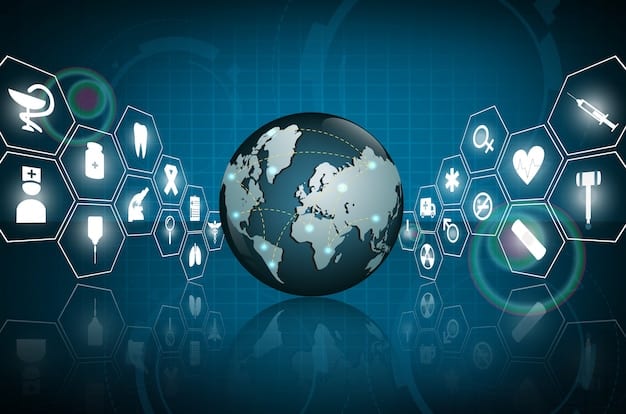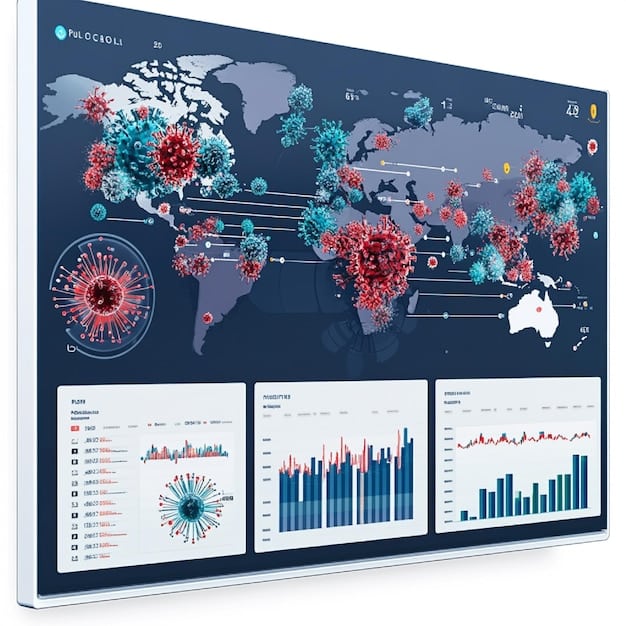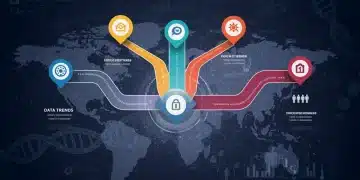The Future of Public Health: Tech & Data Analytics for Prevention

The future of public health is being reshaped by technology and data analytics, enabling more effective disease prevention through advanced monitoring, personalized interventions, and proactive strategies.
The convergence of technology and data analytics is revolutionizing the future of public health: exploring the role of technology and data analytics in disease prevention. This transformation promises more effective and proactive strategies to safeguard community well-being.
The Evolution of Public Health
Public health has historically focused on preventing disease and promoting health through various interventions. Today, technology and data analytics offer unprecedented opportunities to enhance these efforts.
Traditional Public Health Approaches
Traditional public health relied on measures like sanitation, vaccination campaigns, and health education programs. While effective, these methods often lacked the precision and real-time responsiveness that modern technology can provide.
The Digital Transformation
The digital transformation is enabling public health professionals to access and analyze vast amounts of data, leading to more informed decision-making and targeted interventions. This shift is crucial for addressing emerging health threats and improving overall population health.
- Real-time monitoring of disease outbreaks
- Personalized health recommendations based on individual data
- Predictive modeling to anticipate future health crises
The integration of digital tools and data-driven strategies is essential for creating a more resilient and responsive public health system.
The Role of Data Analytics in Disease Prevention
Data analytics plays a pivotal role in understanding disease patterns and identifying at-risk populations. By leveraging advanced analytical techniques, public health officials can implement more effective prevention strategies.

Predictive Modeling
Predictive modeling uses historical data to forecast future health trends and identify potential outbreaks. This allows public health agencies to proactively allocate resources and implement targeted prevention measures.
Surveillance Systems
Modern surveillance systems utilize data from multiple sources, including electronic health records, social media, and environmental sensors, to detect and track disease outbreaks in real-time. This enables rapid response and containment efforts.
- Early detection of emerging health threats
- Improved accuracy in disease forecasting
- Enhanced resource allocation for prevention efforts
Data analytics empowers public health professionals to move from reactive to proactive strategies, improving the effectiveness of disease prevention efforts.
Technology’s Impact on Public Health Interventions
Technology has revolutionized the way public health interventions are delivered, making them more accessible, personalized, and effective. From telemedicine to mobile health apps, technology is transforming healthcare delivery.
Telemedicine and Remote Monitoring
Telemedicine enables healthcare providers to deliver care remotely, expanding access to underserved populations. Remote monitoring devices allow for continuous tracking of vital signs and health indicators, facilitating early intervention.
Mobile Health (mHealth) Applications
mHealth apps provide individuals with personalized health information, reminders, and support, promoting healthy behaviors and self-management of chronic conditions. These apps can also collect valuable data for public health research and surveillance.
- Increased access to healthcare services
- Improved patient engagement and adherence
- Real-time data collection for public health research
Technological advancements are making public health interventions more convenient, accessible, and effective, ultimately improving health outcomes for individuals and communities.
Challenges and Opportunities in Public Health Technology
While technology offers immense potential for improving public health, it also presents significant challenges. Addressing these challenges is crucial for realizing the full benefits of technology in disease prevention.

Data Privacy and Security
The collection and use of health data raise concerns about privacy and security. Robust data governance frameworks and security measures are essential to protect sensitive information and maintain public trust.
Digital Divide
The digital divide refers to the gap between those who have access to technology and those who do not. Addressing this divide is crucial to ensure that technological advancements benefit all members of society, regardless of socioeconomic status or geographic location.
- Developing strong data privacy regulations
- Investing in digital literacy programs
- Promoting equitable access to technology
By addressing these challenges proactively, we can maximize the opportunities that technology offers for improving public health and reducing health disparities.
Ethical Considerations in Data-Driven Public Health
The use of data in public health raises important ethical considerations. Ensuring fairness, transparency, and accountability is crucial for maintaining public trust and preventing unintended consequences.
Bias in Algorithms
Algorithms used in public health analytics can perpetuate existing biases if they are trained on biased data. It is essential to carefully evaluate and mitigate bias in algorithms to ensure equitable outcomes.
Transparency and Accountability
Public health agencies should be transparent about how they collect and use data, and they should be held accountable for ensuring that data is used ethically and responsibly. This includes providing clear explanations of algorithms and decision-making processes.
Community Engagement
Engaging communities in the development and implementation of data-driven public health initiatives is crucial for ensuring that their needs and concerns are addressed. This includes seeking input on data collection, analysis, and use.
Ethical considerations must be at the forefront of data-driven public health to ensure that technology is used to promote health equity and protect vulnerable populations.
The Future of Public Health: A Proactive Approach
The future of public health lies in proactive strategies that leverage technology and data analytics to anticipate and prevent disease. This requires a collaborative effort involving healthcare professionals, policymakers, and community members.
Integrating Technology and Data into Public Health Education
Public health education programs should incorporate training on data analytics, technology, and ethical considerations to prepare the next generation of public health professionals. This will ensure they have the skills and knowledge to effectively use these tools in their work.
Investing in Public Health Infrastructure
Investing in public health infrastructure, including data systems, technology platforms, and workforce development, is essential for realizing the full potential of technology in disease prevention. This includes supporting research and development to advance the field of public health informatics.
Building Partnerships
Building strong partnerships between public health agencies, healthcare providers, technology companies, and community organizations is crucial for creating a comprehensive and coordinated approach to disease prevention. This includes sharing data, resources, and expertise to address complex public health challenges.
By embracing a proactive approach, we can create a future where public health is more effective, equitable, and resilient.
| Key Aspect | Brief Description |
|---|---|
| 📊 Data Analytics | Predictive modeling and surveillance systems for disease outbreak detection. |
| 📱 mHealth Apps | Personalized health information and remote monitoring for better health management. |
| 🔒 Data Privacy | Ensuring secure and ethical handling of health data with robust governance. |
| 🤝 Partnerships | Collaboration between healthcare, tech companies, and communities for comprehensive strategies. |
Frequently Asked Questions
▼
Data analytics allows for predictive modeling and real-time surveillance, enabling early detection and targeted interventions to prevent disease outbreaks.
▼
Mobile health apps provide personalized health information, remote monitoring, and promote healthy behaviors, contributing to better health management and data collection.
▼
Robust data governance frameworks, strong security measures, and transparent data usage policies are essential to protect sensitive information and maintain public trust.
▼
Community engagement ensures that public health initiatives address the needs and concerns of the population, promoting equitable outcomes and building trust in the system.
▼
Public health education programs should incorporate training on data analytics, technology, and ethical considerations to equip future professionals with the necessary skills.
Conclusion
In conclusion, the integration of technology and data analytics holds immense promise for the future of public health, enabling more effective disease prevention and promoting healthier communities. Addressing the challenges and ethical considerations proactively will be essential to realizing the full potential of this transformation.





